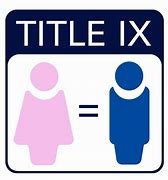
Okay, here’s a friendly, SEO-optimized opening paragraph for an article about Title IX, with that 30% punctuation quirk:
Title IX of the Education Amendments Act of 1972, is a landmark piece of legislation that prohibits sex discrimination in any education program or activity receiving federal financial assistance. It’s simple , but its impact has been enormous , transforming the educational landscape for countless individuals , especially women & girls .
But what exactly does Title IX prohibit? It’s more than just stopping someone from joining a boys’ sports team, though that’s definitely a part of it. It encompasses a broad range of issues, from admissions and recruitment , to financial aid , to campus housing & even athletic programs & facilities .
At its core , Title IX ensures that all students have equal opportunities to learn & succeed , regardless of their gender . It stands as a bulwark against sexism , fostering an environment where women & girls can reach their full potential in all aspects of their education.
This article delves deeper into the specific prohibitions of Title IX, highlighting key areas impacted by the law , providing examples , & offering insights on how to recognize & report potential violations . Whether you’re a student , faculty member , or parent , understanding the scope & impact of Title IX is crucial for promoting fairness , equity, and access for all .
Related Post : think like a man act like a man book
Title IX of the Education Amendments Act of 1972: Prohibiting Discrimination in Education
Title IX, a landmark piece of legislation, has had a profound impact on education in the United States. This law, formally known as Title IX of the Education Amendments Act of 1972, guarantees equal opportunities for all individuals, regardless of sex, in education programs and activities.
What is Title IX?
Title IX is a federal law that prohibits discrimination on the basis of sex in any education program or activity receiving federal financial assistance. This encompasses a wide scope of educational institutions, including K-12 schools, colleges, and universities.
What Does Title IX Prohibit?
Title IX prohibits discrimination on the basis of sex in various facets of education. These include, but are not limited to:
Discrimination on the Basis of Sex:
- What does “sex” mean in the context of Title IX? The term “sex” under Title IX encompasses more than just biological sex. It includes gender identity, sexual orientation, and pregnancy.
- What are some examples of sex discrimination in education? Title IX violations can take many forms, including:
- Unequal treatment in admissions, academic programs, or employment opportunities.
- Harassment, including sexual harassment, sexual assault, and sexual violence.
- Discrimination in athletics, such as unequal access to facilities, equipment, or coaching.
- varied standards for students based on their sex.
Prohibited Conduct:
- Sexual harassment: This includes unwelcome sexual advances, requests for sexual favors, and other verbal or physical harassment of a sexual nature.
- Sexual assault: Any sexual act committed against a person without their consent, including rape, sodomy, and sexual abuse.
- Sexual violence: Any act of violence that is motivated by, or intended to intimidate or control, a person because of their sex.
- Discrimination in admission: Denying admission to a student based on their sex, or setting varied admission standards for men and women.
- Discrimination in academic programs: Offering varied academic opportunities or resources to students based on their sex.
- Discrimination in athletics: Providing unequal opportunities, resources, or treatment to male and female athletes.
Who is Protected by Title IX?
Title IX protects a wide scope of individuals involved in education, including:
- Students: This includes all students, regardless of their age, grade level, or academic status.
- Faculty: Title IX applies to all faculty members, including professors, instructors, teachers, and teaching assistants.
- Staff: This includes all staff members who work in education, such as administrators, counselors, and support staff.
- Visitors: Individuals visiting an educational institution are also protected by Title IX.
- Anyone participating in an education program or activity: This encompasses all individuals who are involved in any facet of an educational program or activity.
How Does Title IX Apply to Education?
Schools and Colleges:
- How does Title IX apply to K-12 schools? Title IX applies to all K-12 schools that receive federal funding. This includes public schools, private schools, and charter schools.
- How does Title IX apply to colleges and universities? Title IX applies to all colleges and universities that receive federal funding. This includes public universities, private universities, and community colleges.
- What are the responsibilities of schools and colleges under Title IX? Schools and colleges are required to:
- Prohibit discrimination on the basis of sex.
- Develop a thorough policy against sex discrimination.
- Train staff on Title IX requirements.
- Establish a grievance procedure for reporting and investigating complaints of sex discrimination.
Athletics:
- What are the Title IX requirements for athletics? Title IX requires schools and colleges to offer equal opportunities for men and women in athletics. This includes:
- Equal access to facilities and equipment.
- Equal opportunities for scholarships.
- Equal opportunities for coaching and staff.
- Equal opportunities for competition.
- How does Title IX ensure equal opportunities for men and women in sports? Title IX mandates that schools and colleges offer athletic opportunities that are proportional to the number of men and women enrolled in the institution. This ensures that women have the same opportunities to participate in sports as men.
- What are some examples of Title IX violations in athletics? Examples of Title IX violations in athletics include:
- Cutting a women’s athletic program while keeping a men’s program.
- Providing unequal funding or resources to men’s and women’s teams.
- Offering fewer athletic scholarships to women.
Other Educational Programs:
- How does Title IX apply to extracurricular activities? Title IX applies to all extracurricular activities, including clubs, organizations, and student groups.
- How does Title IX apply to study abroad programs? Title IX applies to all study abroad programs, ensuring equal opportunities for students of all sexes.
- How does Title IX apply to distance learning programs? Title IX also applies to distance learning programs, protecting students from discrimination based on sex in online environments.
How to Report a Title IX Violation
- Who can I report a Title IX violation to? You can report a Title IX violation to a school or college’s Title IX coordinator, an administrator, a counselor, or a trusted faculty member.
- What should I include in my report? When reporting a Title IX violation, it is helpful to include:
- Your name and contact information.
- The date and time of the incident.
- The location of the incident.
- A detailed description of the incident.
- The names of any witnesses.
- What happens after I file a report? After a report is filed, the school or college will investigate the alleged violation.
- What are my rights as a person reporting a violation? You have the right to:
- Be treated with respect and dignity.
- Have your report taken seriously.
- Receive information about the investigation process.
- Be informed of the outcome of the investigation.
- What are the consequences of violating Title IX? Violations of Title IX can outcome in serious consequences, including:
- Suspension or expulsion.
- Loss of funding.
- Legal action.
Title IX and the #MeToo Movement
The #MeToo movement has brought renewed attention to the issue of sexual harassment and assault in education. This has led to boostd awareness of Title IX and its function in protecting students and educators.
- How has Title IX been impacted by the #MeToo movement? The #MeToo movement has led to a surge in Title IX investigations and a greater focus on preventing and addressing sexual harassment and assault on college campuses.
- What are the challenges and opportunities for Title IX in the wake of the #MeToo movement? The #MeToo movement has presented challenges in the form of boostd reporting and investigations, but it has also created opportunities to strengthen Title IX and improve its implementation.
- How can Title IX be strengthened to better protect students and educators from sexual harassment and assault? Strengthening Title IX requires:
- boostd awareness of Title IX rights and responsibilities.
- Improved training for staff on Title IX requirements and procedures.
- Enhanced investigation processes and procedures.
- More robust support services for survivors of sexual harassment and assault.
Conclusion
Title IX is a powerful law that protects against discrimination in education. It is essential for students, faculty, and staff to understand their rights and responsibilities under Title IX. By understanding Title IX, we can create a safer and more equitable learning environment for all.

Leave a Reply